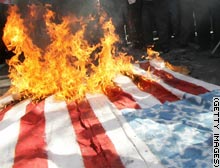“Quicunque vult salvus esse, ante omnia opus est, ut teneat catholicam fidem.” “Whosoever will be saved, before all things it is necessary that he hold the catholic faith.” The Creed of Athanasius
Wednesday, July 26, 2006
Friday, July 07, 2006
Flags and Icons

Chief Justice John Roberts, although a strong opponent of abortion “rights,” has stated that he doesn’t foresee a time when Roe v. Wade will be overturned. It’s the “settled law of the land.”
This year a proposed constitutional amendment which would ban flag burning as a means of public expression fell just one vote short of passing. Considered by some as a means of free speech, flag burning is regarded by others as especially heinous during time of war.
 These two issues, flag burning and abortion, when placed in juxtaposition reveal how convoluted our values truly are. Normally the trails of flag burning (free speech) and a woman’s right to abortion (by way of right to privacy) have little to do with each other. They are perhaps parallel within the Bill of Rights and Constitutional Amendments, but they don’t necessarily intersect. That is, until Country Music steps into the foray.
These two issues, flag burning and abortion, when placed in juxtaposition reveal how convoluted our values truly are. Normally the trails of flag burning (free speech) and a woman’s right to abortion (by way of right to privacy) have little to do with each other. They are perhaps parallel within the Bill of Rights and Constitutional Amendments, but they don’t necessarily intersect. That is, until Country Music steps into the foray.
Enter Natalie
 When Natalie Maines exercised her right to public speech and spoke against the Iraq War and President Bush, the marketplace reacted. Her group, the Dixie Chicks, lost millions in bookings, air play, and record sales. Now, I can’t and I won’t defend what
When Natalie Maines exercised her right to public speech and spoke against the Iraq War and President Bush, the marketplace reacted. Her group, the Dixie Chicks, lost millions in bookings, air play, and record sales. Now, I can’t and I won’t defend what
When Tim McGraw sang, “Red Rag Top”, a song about a “young and wild” couple who “did what they did” because they “decided not to have a child,” the marketplace barely hiccupped. The lyrics do not schwaffle. The young girl is as a “mother-to-be,” and she carries a child, not unidentified nebulous tissue. This reflects the dichotomy of thought found among many who consider abortion a permissible option. Even though they believe what is being carried inside the woman is a human infant, they will still proceed to terminate his life. The law of the land allows them this right. Although the song does express some remorse over the decision, abortion is still upheld. In fact, the song’s success may well be precisely because it allows the listener to take from it what he will, either a pro-choice or a regret-for-an-abortion message. How postmodern is that? So, McGraw's raking in the dough.
they did” because they “decided not to have a child,” the marketplace barely hiccupped. The lyrics do not schwaffle. The young girl is as a “mother-to-be,” and she carries a child, not unidentified nebulous tissue. This reflects the dichotomy of thought found among many who consider abortion a permissible option. Even though they believe what is being carried inside the woman is a human infant, they will still proceed to terminate his life. The law of the land allows them this right. Although the song does express some remorse over the decision, abortion is still upheld. In fact, the song’s success may well be precisely because it allows the listener to take from it what he will, either a pro-choice or a regret-for-an-abortion message. How postmodern is that? So, McGraw's raking in the dough.
The dynamic message is this: It is less patriotic to burn a flag on a public street than to burn babies out of a mother’s womb.
Or maybe it’s this way: It’s more patriotic to a burn baby out of a mother’s womb than to burn a flag on a public street.
Don’t get me wrong. I don’t like burning flags as a means of public expression, especially during times of war. That is the time when our troops need a public display of support for them, and flag burning sends exactly the opposite. It is, if you will, a message of aid and comfort to the enemy. Specifically it says that the ideals for which Americans have stood and fought for are going up in smoke and dying with the embers and ashes of that burning flag. It is a cremation by effigy of the democratic dream for which this nation has fought and is fighting for. But what does it say of us as Americans when we defend the flag with great fervor on the one hand, only to applaud destroying our future on the other?
 Women are the bearers of the future physically in a way no man can either be or portray. They give birth to future generations. Motherhood is the iconic symbol of a rich and vital future. It is not for idle whimsy that
Women are the bearers of the future physically in a way no man can either be or portray. They give birth to future generations. Motherhood is the iconic symbol of a rich and vital future. It is not for idle whimsy that
Women who abort are mothers who kill their own young. These are women who by that very act state that the future has room for only a select few. These women are the arbiters of those who will be culled out for death. That is not the face of
Motherhood has its foundation in a God who gives gifts to men. After the first sin God told the first woman that pain would be increased in childbirth (Ge
Both flag burning and willful abortion intersect at one vital point: There is despair for the future. Flag burning says that the nation is headed in a direction that will lead to its destruction. When the future appears too bleak for either parents or the infant, abortion becomes the “logical” choice. In “Red Rag Top,” the couple chose abortion because “I was out of a job and she was in school/Life was fast and the world was cruel.” So, the infant paid the price of the parents' lousy choice of premature sex. That was an expensive lay. And the tote board just keeps on rackin' up each time the song plays, teaching its values to more and more listeners as it does.
Wherever for some there is no immediately self-gratified hope of a future, apparently the only option is to destroy any hope of a future for others – either burn a flag to symbolize the destruction of democracy or have an abortion, or both. Right now both represent the full-fledged “
But if you’re a Country singer, be sure which way you sing. God has His icons and foundations, and that’s all just fine and dandy, but we just won’t nevermind about Him anymore, will we, now? For good ole American Country singers and their fans the truly American way is that abortion is “in,” but you had best watch your mouth when it comes to walkin’ the patriotic line.
It just seems to be a bit hypocritical to me, that’s all.
Monday, July 03, 2006
Take Eat, Take Drink

Take Eat, Take Drink
The Lord’s Supper Through the Centuries
Ernest Bartels
CPH, 2004
ISBN 0758600372
286 pages, including answer key
How has it happened that four little words, “This is My body,” have been so variously interpreted, resulting in such a myriad of applications and beliefs?
What is the doctrine and practice of the Lord’s Supper? From the Upper Room to its present-day setting on various altars, Ernest Bartels unravels the history behind this Sacrament, the various practices now in evidence and the doctrines which have resulted. Bartels presents a historical roadmap any novice can follow with ease, yet he is unflinchingly faithful to his own confession along the route. His markers are clear and obvious. Along the way the reader is able to understand where the various actors in history that shape the modern worship wars “fit.” Who was Luther? Zwingli? Bucer? Calvin? Did they affect any current denominations? How? Bartels makes the issue clear. Digging deeper, Bartels opens the history of terms like “closed” versus “close” communion. He also looks behind the issue of using individual cups over the common cup not only among Lutherans, but also among other denominations.
This book is written in a deceptively simple style. By that I mean this: The depth of Bartels’ insights and weight of his knowledge are revealed precisely by the fact that he could write in a manner that is accessible to a wide audience, much like Luther’s Small Catechism. This is a book that could be the source of much study and catechetical discussion in a congregation, especially one interested in the history of the early councils of the church. Bartels brings the reader full circle, uniting the present with the past as una sancta:
We have only the words of our Lord for our Christian life for our salvation. They are enough. Jesus said, “Heaven and earth will pass away, but My words will not pass away” (Matthew 24:35). Christ’s words endure forever. That was certain for the early church and it is certain today.
Bartels, a native of Tecumseh, Nebraska, graduated from Concordia Theological Seminary in Springfield, Illinois. He served congregations in Wisconsin and North Dakota. He held several advanced degrees and wrote numerous articles for publication.
Also posted at Luther Library.